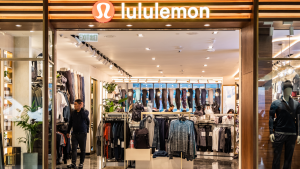Recent comments by Bank of America (NYSE:BAC) CEO Brian Moynihan have increased my confidence in my thesis that the U.S. is heading for “a soft landing.” Specifically, Moynihan said the U.S. Federal Reserve already achieved “a soft landing.” That being said, investors may want to consider jumping back into consumer discretionary stocks – especially those that pulled back too much.
Consumer Discretionary Stocks: General Motors (GM)

General Motors (NYSE:GM) stock is down about 18% from its July high amid worries about the economy, higher interest rates, and the strike by its unionized employees. As has been the case in the past, I expect GM and its union to reach a deal that is fair to both sides and won’t “break the bank” at GM. In addition, the automaker’s net income jumped to $2.57 billion last quarter, up from $1.69 billion during the same period a year earlier. After the recent decline of GM stock, the shares trade at a tiny forward price-earnings ratio of 4.75. In addition, analysts, on average, expect its earnings per share to climb to $7.71 this year from $7.59 in 2022.
Cheesecake Factory (CAKE)

Cheesecake Factory (NASDAQ:CAKE) is a good stock to buy within the sector. Last quarter, the company’s top line climbed 4% versus the same period a year earlier to $866 million, while its income from operations jumped 5.5% year-over-year. Last quarter, the company bought back $9.3 million of CAKE stock, and it has a rather high dividend yield of 3.7%. The shares have a very enticing forward price-earnings ratio of just nine.
Consumer Discretionary Stocks: Penn Entertainment (PENN)

Disney’s (NYSE:DIS) ESPN just signed a $2 billion deal with Penn Entertainment (NASDAQ:PENN) to rebrand its sportsbook as ESPN Bet. I believe that the arrangement will be a positive, game changer for PENN stock. Moreover, because Disney received $500 million of warrants for PENN stock as part of the deal, the conglomerate is financially incentivized to work hard to pitch ESPN Bet to its audience. Helping, the U.S. online sports betting market as a whole soared 70% year-over-year to $31 billion in the first quarter, and the ESPN deal gives Penn an inside track at getting a much bigger piece of this huge pie.
Lululemon (LULU)

Investment bank Raymond James recently issued a glowing review of yoga apparel maker Lululemon (NASDAQ:LULU). In fact, the firm called LULU “one of the highest quality companies among global brands, with a strong yet still emerging brand with significant opportunities for growth.” In addition, according to a recent report, 10% of Americans now practice yoga, and the number of Americans engaging in it soared “63.8% between 2010 and 2021.” This is clearly a trend that is not going away, and it is likely to continue to grow very rapidly going forward.
Supporting my thesis, in Q2 LULU’s men’s and women’s product revenue jumped 15% year-over-year and 16% year-over-year, respectively. Moreover, LULU’s profits continue to soar, as its income from operations jumped 23% YOY, excluding some items, last quarter. The shares are changing hands at a forward price-earnings ratio of 32, which is low, given the company’s rapid growth and strong prospects.
Consumer Discretionary Stocks: Dutch Bros (BROS)

In a column published a year ago, I wrote that there was “an excellent chance that Dutch Bros (NYSE:BROS)” could use its “‘coolness factor’” to embark on a “path to riches.”
That trend appears to be playing out, as the coffee chain on Aug. 8 reported that its top line had soared 34% in the second quarter versus the same period a year earlier, while its ” systemwide same shop sales growth” came in at nearly 4%. Moreover, BROS noted that its marketing initiatives had helped enable its same-store sales to climb 5.8 percentage points in Q2 versus Q1.
Also noteworthy is that the gross profit of the firm’s company-owned shops had soared to $52.1 million versus $31.2 million in Q2 of 2022. The metric shows that the firm’s overall profitability is poised to jump once its marketing spending drops. The latter phenomenon should occur once its brand awareness increases over the next year or two. The shares are changing hands at a very low trailing price-sales ratio of just 1.5.
TJX Companies (TJX)

TJX Companies (NYSE:TJX), which operates discount retailers, continues to grow rapidly, while its profits are quickly increasing. It appears that many consumers are gravitating towards the firm’s combination of low prices and fairly high-quality products. Last quarter, TJX’s top line soared 7.8% versus the same quarter a year earlier, while its comparable store sales climbed an impressive 6% year-over-year. “Our overall comp sales growth was driven by customer traffic, which increased at every division, Our overall apparel and accessories sales were very strong,” CEO Ernie Herrman noted. In addition, the retailer’s earnings per share soared 23% year-over-year to 85 cents.
Best Buy (BBY)

Best Buy (NYSE:BBY) appears to be rather well-positioned for the upcoming holiday season. That’s because, after many American consumers bought new tech products in 2020, a large percentage of them may be looking to upgrade their products again this year. Moreover, the proliferation of artificial intelligence could help Best Buy sell many new computers as consumers look to exploit this trend as effectively as possible.
Starting in October, the retailer will be offering special discounts and rewards in an effort to get consumers’ attention and kick off the holiday season on a strong note. What’s more, the company reported that it intends to offer many state-of-the-art products that utilize “new and emerging technologies, like e-transportation, health and wellness, and outdoor living.” These offerings could very well entice many consumers into spending much more at Best Buy than in past years. The shares are changing hands at a very low price-earnings ratio of 11.8 and have a high dividend yield of 5.3%.
As of this writing, Larry Ramer did not hold (either directly or indirectly) any positions in the securities mentioned in this article. The opinions expressed in this article are those of the writer, subject to the InvestorPlace.com Publishing Guidelines.
